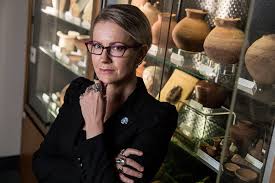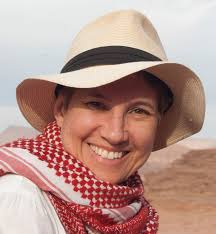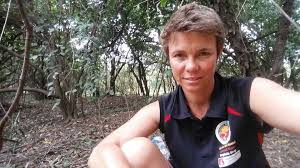CACHE Leadership Announcement

CACHE is excited to announce its new Director, Associate Professor Ronika Power (Ancient History), and Deputy Directors Dr Karin Sowada (Ancient History) and Dr Emilie Ens (Environmental and Earth Sciences). A massive thanks to outgoing Director, Professor Bronwen Neil, and Deputy Director, Professor Malcolm Choat, for their invaluable foundational leadership - we wish them all the best for the future. CACHE’s new leadership team brings a wealth of knowledge from diverse fields including bioarchaeology, archaeology and environmental science. They look forward to furthering CACHE’s interdisciplinary objectives and showing how crucial our knowledge of the past is for understanding our present and improving our future!
Meet our new leadership team
Director of CACHE, Associate Professor Ronika Power FSA FRSN

Associate Professor Ronika Power has worked through her career as bioarchaeologist across the humanities and sciences. She is a founding member of the CACHE leadership team, having served as Deputy Director from 2018-2020. Although based in the Faculty of Arts, Ronika is one of the inaugural Superstars of STEM for Science & Technology Australia and is a leading national advocate for interdisciplinarity. In recognition of the quality of her research, A/Prof. Power received several peer-esteem indicators in 2019, including a New South Wales Tall Poppy in Science Award from the Australian Institute of Policy and Science; the Max Crawford Medal from the Australian Academy of the Humanities; the inaugural Kwang-Su Lim Early Career Award from the Union Académique Internationale, Brussels; and was unanimously elected as a Fellow of the Royal Society of New South Wales. A/Prof. Power is the primary or consulting human osteologist on 10 high-profile international interdisciplinary projects, including two UNESCO World Heritage sites, and is an Honorary Research Associate of the McDonald Institute for Archaeological Research at the University of Cambridge, UK. A/Prof. Power regularly engages national and international institutional, political, industry and corporate leaders to provide expertise and strategy on issues of cultural and socio-economic sustainability that are transferable between ancient and modern contexts. Ronika is a well-known research communicator who connects with audiences of all ages across broad media platforms and live events. By weaving Science, Technology, the Arts and Humanities, Mathematics and Medicine into stories about real people living and dying in the past, Ronika dissolves traditional boundaries and stereotypes that perpetuate science and culture as separate, unrelated phenomena.
Founding Director Prof. Bronwen Neil will continue to mentor the leadership team while seconded to Australian Council of Research as Executive Director for Humanities and Creative Arts, as will Founding Deputy-Director Prof. Malcolm Choat during his term as Acting Associate Dean of Research for the Faculty of Arts at Macquarie University.
Deputy Director of CACHE, Dr Karin Sowada
 Dr Karin Sowada is a specialist in the archaeology of Egypt and the Middle East, with a focus on foreign engagement, trade and societal change in the Bronze Age. She is an Australian Research Council Future Fellow (2017 - ) leading the four-year Project Pyramids, Power and the Dynamics of States in Crisis in the Department of Ancient History. Karin has an extensive background in interdisciplinary research, with a particular focus on scientific analysis of museum-based archaeological datasets. Through her own work, Karin fosters wide collaboration, recognising the importance of reaching into different disciplines to bring fresh perspectives to questions of societal change in the ancient world, and the implications for how we understand human society today. Karin has been a member of the executive board of CACHE since its inception, and also serves on the Department Research Committee and the Board of the Australian Centre for Egyptology at Macquarie University. Over the last 30 years, Karin has been involved in archaeological fieldwork in the Egypt and the Middle East, and worked on scientific projects with partner institutions including ANSTO, the Chau Chak Wing Museum (University of Sydney), and the Museum of Fine Arts, Boston.
Dr Karin Sowada is a specialist in the archaeology of Egypt and the Middle East, with a focus on foreign engagement, trade and societal change in the Bronze Age. She is an Australian Research Council Future Fellow (2017 - ) leading the four-year Project Pyramids, Power and the Dynamics of States in Crisis in the Department of Ancient History. Karin has an extensive background in interdisciplinary research, with a particular focus on scientific analysis of museum-based archaeological datasets. Through her own work, Karin fosters wide collaboration, recognising the importance of reaching into different disciplines to bring fresh perspectives to questions of societal change in the ancient world, and the implications for how we understand human society today. Karin has been a member of the executive board of CACHE since its inception, and also serves on the Department Research Committee and the Board of the Australian Centre for Egyptology at Macquarie University. Over the last 30 years, Karin has been involved in archaeological fieldwork in the Egypt and the Middle East, and worked on scientific projects with partner institutions including ANSTO, the Chau Chak Wing Museum (University of Sydney), and the Museum of Fine Arts, Boston.
Deputy Director of CACHE, Dr Emilie Ens
 Dr Ens is a founding member of the CACHE executive committee. Dr Ens and her cross-cultural ecology lab group are actively involved in collaborative research with Indigenous ranger groups and communities to better understand and manage Australia's bio-cultural resources. Dr Ens was a DECRA Fellow (2013-2016) and is currently lead CI on two ARC projects that involve: 1. Multidisciplinary investigation into prehistoric Aboriginal dispersal of large seeded rainforest trees across eastern Australia with partners at the NSW Herbarium, Sth Australian Museum and the Tropical Indigenous Ethnobotany Centre; and investigation of the impacts of sea level rise and invasive ungulates on culturally important floodplains of the Laynhapuy Indigenous Protected Area with Macquarie University and Yirralka Rangers colleagues. She has long standing partnerships with The Nature Conservancy, CSIRO's Atlas of Living Australia and the Ecological Society of Australia to raise the profile of Indigenous knowledge and active involvement of Indigenous people in environmental conservation and research. Dr Ens led the Ngukurr Wi Stadi Bla Kantri (We study the country) Research Team to win the 2017 Eureka Prize for Innovation in Citizen Science and is co-leader of Australia's first Bush Uni, the Wuyagiba Study Hub with Elders of south east Arnhem Land. She also lectures in Environmental Management at Macquarie University.
Dr Ens is a founding member of the CACHE executive committee. Dr Ens and her cross-cultural ecology lab group are actively involved in collaborative research with Indigenous ranger groups and communities to better understand and manage Australia's bio-cultural resources. Dr Ens was a DECRA Fellow (2013-2016) and is currently lead CI on two ARC projects that involve: 1. Multidisciplinary investigation into prehistoric Aboriginal dispersal of large seeded rainforest trees across eastern Australia with partners at the NSW Herbarium, Sth Australian Museum and the Tropical Indigenous Ethnobotany Centre; and investigation of the impacts of sea level rise and invasive ungulates on culturally important floodplains of the Laynhapuy Indigenous Protected Area with Macquarie University and Yirralka Rangers colleagues. She has long standing partnerships with The Nature Conservancy, CSIRO's Atlas of Living Australia and the Ecological Society of Australia to raise the profile of Indigenous knowledge and active involvement of Indigenous people in environmental conservation and research. Dr Ens led the Ngukurr Wi Stadi Bla Kantri (We study the country) Research Team to win the 2017 Eureka Prize for Innovation in Citizen Science and is co-leader of Australia's first Bush Uni, the Wuyagiba Study Hub with Elders of south east Arnhem Land. She also lectures in Environmental Management at Macquarie University.
Dr Ens is particularly keen to raise awareness about our multidisciplinary Research Centre among the Faculty of Science, the department of Environmental and Earth Sciences, HDRs and ECRs and potential external partners. There is a groundswell of human-nature research at Macquarie and globally, so with Emilie as Deputy, CACHE is well placed to grow and build strength at MQ in this increasingly important area of research.
